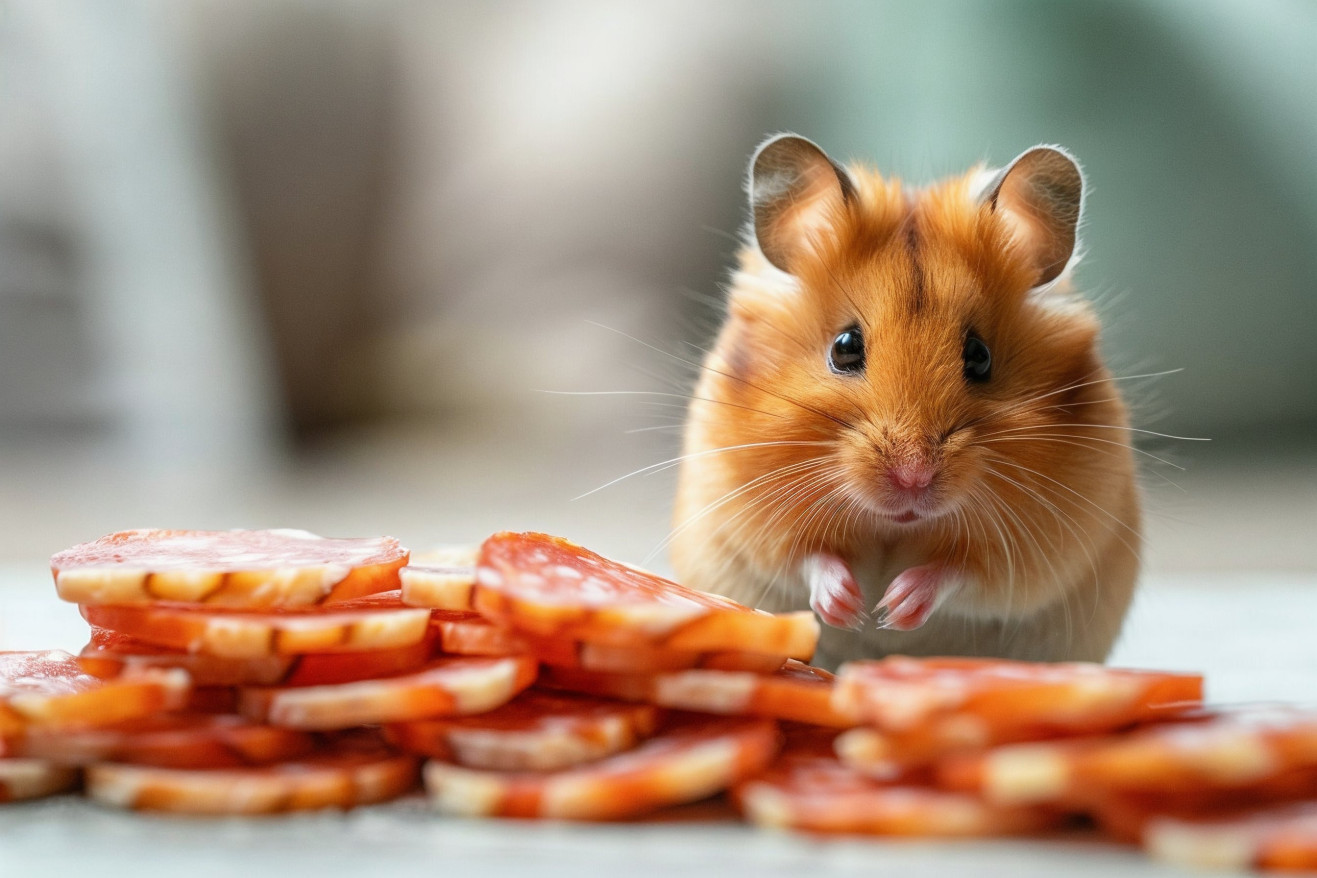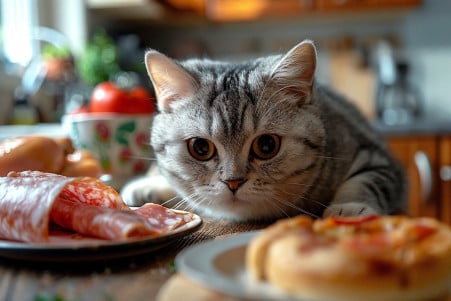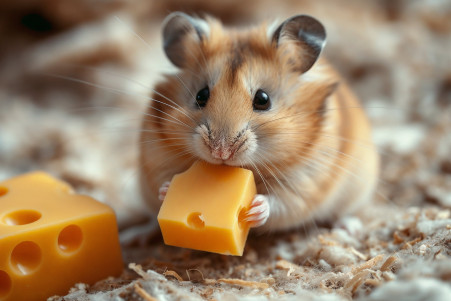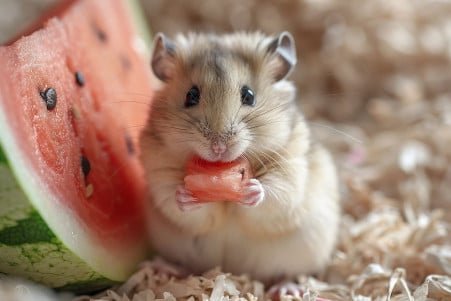Can Hamsters Eat Salami? What You Need to Know About This Tasty Treat
24 April 2024 • Updated 23 April 2024

If you’ve ever wondered if your hamster can enjoy a slice of salami, you’re not alone. However, while it may be tempting to share your favorite snack with your furry friend, it’s important to know that salami is not a good option for hamsters. This is because it’s high in fat and salt, which can cause health problems like obesity and dehydration in hamsters. Instead, consider feeding your hamster healthier options like small amounts of cooked chicken, eggs, or vegetables when you want to give them a protein-packed treat.
In this article, we’ll cover the advice of vets and experienced hamster owners to help you decide if salami can be a part of your hamster’s diet. By reviewing the nutritional information and research on the effects of high-fat, high-sodium foods on small animals, you’ll be able to make an informed decision about what to feed your hamster to ensure they stay healthy and happy.
Can hamsters eat salami?
Nutritional Needs and a Balanced Diet for Hamsters
To keep your hamster healthy, it's important to know what a balanced diet looks like for them. According to PetMD, hamsters require a high-fiber diet that includes 15-25% protein, 35-40% carbohydrates, and 4-5% fat. This should be made up of a high-quality commercial pellet or seed mix, which can then be supplemented with fresh fruits and vegetables.
In order to avoid deficiencies and ensure that your hamster is getting all the nutrients they need, it's important to make sure that they have a well-rounded diet. The Spruce Pets suggests that you feed your hamster a variety of foods, including greens, carrots, broccoli, whole grains, cooked eggs, and lean meats. Overfeeding and an unbalanced diet can lead to obesity, diabetes, and other health problems.
This is why it's important to make sure that you're monitoring your hamster's food intake and portion sizes. Omlet says that you should feed your Syrian hamster 1-2 teaspoons of dry food a day and that you should feed your dwarf hamster even less. Make sure that you're watching for signs of overeating and undereating so that you can make sure that your hamster is healthy and not suffering from the health problems that can come from an improper diet - which, let's face it, salami's high fat and salt content would definitely contribute to.
Risks of Giving Hamsters Salami
Salami is a type of cured, processed meat that is packed with salt, fat, and preservatives, all of which are potentially harmful to hamsters. As noted by Hepper, the high salt content in salami can lead to dehydration and kidney issues, among other problems, in hamsters, whose kidneys are not designed to process such high levels of sodium.
The high fat content in salami can also lead to obesity in hamsters, which in turn can cause respiratory problems and other issues, according to Medium. Meanwhile, the preservatives and spices, including garlic, that are used in salami can upset a hamster's stomach, which is very sensitive. As a result, hamsters may experience digestive problems, diarrhea, and even life-threatening issues like wet tail, according to ThePetsTome.
Given the many health problems that can arise from the high salt, fat, and other additives in salami, it's best to avoid giving this processed meat to hamsters. Instead, hamster owners should prioritize feeding their pets a well-rounded diet that includes high-quality hamster food, fresh fruits and vegetables, and the occasional safe source of protein.
Other Protein Options for Hamsters
Hamsters need protein in their diet, but as omnivores, they should not eat salami. Small Pet Select lists several other protein options that are safe and healthy for hamsters, including cooked lean meats such as chicken or turkey, hard-boiled eggs, and insects like mealworms. My Family Vets also lists nuts and seeds as a source of protein, but they should be fed in moderation due to their high fat content.
It’s important to feed your hamster a variety of protein sources to ensure they get all the nutrients they need. Hepper explains that while hamsters are omnivores, the majority of their diet should be made up of a high-quality commercial pellet. Make sure to keep an eye on portion sizes when feeding your hamster protein treats to make sure they don’t overeat and to ensure they maintain a balanced diet.
How Often Should You Feed Your Hamster and How to Monitor Their Diet
Because of their high metabolisms and eating habits, hamsters should be fed on a regular schedule. The RSPCA says that fresh pellets and water should be provided every day, and fresh fruit, vegetables, and protein should be given as treats.
Weight loss, hair loss, labored breathing, and skin conditions are all signs of malnutrition, according to the Clarington Animal Hospital. On the other hand, overfeeding can lead to obesity and other health problems. BUCATSTATE suggests feeding one tablespoon of hamster formula per day and supplementing with treats and fresh food.
It's important to monitor your hamster's diet by keeping an eye on how much food they're eating, how much is left over, and their general behavior. This will help you make sure that your hamster is getting the right amount of food and will help you catch any signs of over- or underfeeding before they become a problem.
Conclusion: How to Keep Your Hamster Healthy and Happy
Salami and other processed meats are not safe for hamsters due to their high fat, salt, and preservative content. A healthy diet that includes high-quality commercial pellets, fresh fruits and vegetables, and the occasional healthy protein source is important for a hamster's health. It's also important to watch portion sizes and how often you feed your hamster to prevent obesity and dehydration.
In addition to these general guidelines, it's important to pay attention to your hamster's individual needs and preferences to make sure they're getting the right nutrients. By making sure to offer a balanced, nutritious diet and paying attention to your hamster's specific needs, you can help ensure that your pet lives a long and healthy life. If you have any questions or concerns about your hamster's diet, make sure to talk to a vet for personalized advice.


